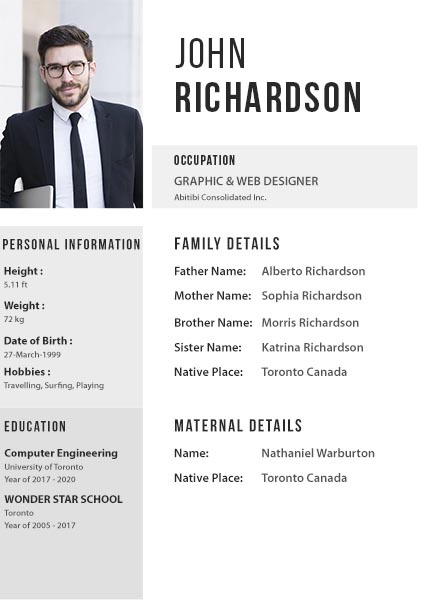Comprehensive Guide to Creating an Impressive Marriage Biodata
Marriage is a significant milestone in many cultures, and creating a marriage biodata is an essential step in the matchmaking process. This guide will help you understand the importance of a marriage biodata, how to create one, and tips for making it stand out.
What is a Marriage Biodata?
A marriage biodata is a document that provides personal information about an individual, typically used in the context of arranged marriages. It includes details such as family background, education, profession, and partner preferences. Unlike a resume, which focuses on professional qualifications, a marriage biodata gives a holistic view of an individual's life and values.
Why is a Marriage Biodata Important?
In many cultures, particularly in South Asia, marriage biodatas play a crucial role in the arranged marriage process. They provide a structured way for families to share essential details and help in assessing compatibility. A well-crafted biodata can make a strong first impression and significantly increase the chances of finding a suitable match.
Key Elements of a Marriage Biodata
Creating an effective marriage biodata involves including several key elements:
Personal Information
Name, Age, Contact Information
Photograph
Family Background
Details about parents, siblings, and their professions
Educational Qualifications
Academic history, degrees, and significant achievements
Professional Background
Current job, previous experience, and career aspirations
Physical Attributes
Height, weight, complexion, and other relevant details
Interests and Hobbies
Personal interests and extracurricular activities
Partner Preferences
Desired qualities and deal-breakers
How to Create an Effective Marriage Biodata
Choosing the Right Format
A clean and organized format is crucial. Use clear headings and bullet points for easy readability. Ensure your document is well-structured and free from grammatical errors.
Tips for Writing Each Section
Personal Information: Keep it concise but complete. Include a professional photograph.
Family Background: Provide essential details without overwhelming the reader.
Educational Qualifications: Highlight significant achievements and institutions.
Professional Background: Focus on current and past roles, emphasizing career growth.
Physical Attributes: Be honest and precise.
Interests and Hobbies: Showcase your personality through your hobbies.
Partner Preferences: Clearly state your expectations but be realistic.
Detailed Breakdown of Each Section
Personal Information
Start with your full name, age, and contact details. Including a high-quality photograph is essential as it adds a personal touch and helps create a connection.
Family Background
Briefly describe your parents, their professions, and details about your siblings, if any. This section helps in understanding your family values and background.
Educational Qualifications
List your educational history, including schools, colleges, degrees, and any notable achievements. This gives an insight into your academic journey and intellectual capabilities.
Professional Background
Detail your current job, previous experiences, and future career goals. This section should reflect your professional growth and aspirations.
Physical Attributes
Include your height, weight, and complexion. Be honest, as this information helps in wedding biodata setting realistic expectations.
Interests and Hobbies
Mention your hobbies and interests to showcase your personality. This can include anything from sports and arts to reading and travel.
Partner Preferences
Clearly state the qualities you seek in a partner and any deal-breakers. This section helps in aligning expectations and finding compatible matches.
Dos and Don’ts of a Marriage Biodata
Dos:
Keep it concise and to the point.
Use bullet points for clarity.
Be honest and accurate.
Proofread for errors.
Don’ts:
Avoid using jargon or complex language.
Don’t include unnecessary personal details.
Avoid negative language or unrealistic demands.
Sample Marriage Biodata Template
Name: Jane Doe Age: 28 Contact Information: janedoe@example.com Photograph: [Insert Professional Photo]
Family Background:
Father: John Doe, Businessman
Mother: Mary Doe, Teacher
Siblings: 1 Brother, Engineer
Educational Qualifications:
B.A. in English Literature, XYZ University
M.A. in Journalism, ABC University
Professional Background:
Content Writer at XYZ Company
Freelance Journalist
Physical Attributes:
Height: 5'6"
Weight: 60 kg
Complexion: Fair
Interests and Hobbies:
Reading, Traveling, Cooking
Partner Preferences:
Professionally stable
Family-oriented
Non-smoker
Customizing Your Marriage Biodata
Personalize the template to reflect your unique personality and preferences. Add specific details that highlight your individuality and values.
Digital vs. Printed Biodata
Digital Biodata:
Easily shareable via email or online platforms
Environmentally friendly
Printed Biodata:
Tangible and can be shared in person
May be preferred in traditional settings
Using a Marriage Biodata in the Digital Age
With the rise of online matchmaking platforms, digital biodatas have become more common. Ensure your digital biodata is secure and shared only with trusted individuals or platforms to protect your privacy.
Expert Tips for a Standout Marriage Biodata
Keep It Simple: Avoid clutter and focus on the essentials.
Be Authentic: Honesty builds trust and sets realistic expectations.
Seek Feedback: Get input from family or friends to refine your biodata.
Conclusion
Creating a marriage biodata template is an essential step in the arranged marriage process. It provides a structured way to present yourself and helps in finding a compatible partner. By following the tips and guidelines in this article, you can create an effective and standout marriage biodata that genuinely represents you.




